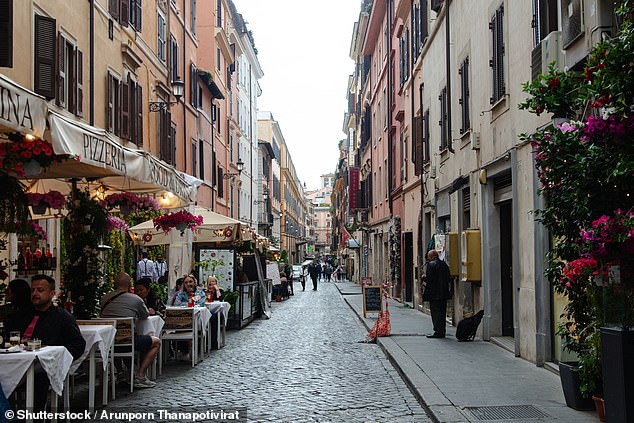- In 2021, some 180,000 temporary licenses were issued for outdoor dining
Italy has long been renowned for its outdoor dining: a local way of life for Italians and an attractive method of enjoying a meal for tourists.
But many Italians are now turning their backs on outdoor dining traditions, as the amount of street space taken up by tables has increased a staggering five-fold in just the last three years.
Locals are fed up with tables and chairs clogging sidewalks and spilling into parking spaces, as well as rising levels of noise pollution in the already bustling city center.
Outdoor dining took Italy by storm in 2021 following the easing of Covid restrictions, which greatly simplified the process for restaurants and bars to apply for outdoor seating licences.
This allowed food and beverage establishments to stay afloat while the country was going through a time of economic instability by retaining customers who were not allowed to sit indoors.
Many Italians are turning their backs on outdoor dining, a popular outdoor dining tradition in Italy, because they are tired of increased noise pollution and public space taken up by tables.

Italy’s Business Minister Adolfo Urso revealed that the government had plans to extend some 180,000 temporary licenses granted to companies during the pandemic starting this summer.
Since then, some 180,000 temporary licenses have been granted to restaurants across Italy, according to the Foundation of the Institute for Economic Research (FIPE).
On Thursday, Business Minister Adolfo Urso said the Italian government had made plans to extend temporary licenses indefinitely starting this summer.
“We believe this is an opportunity to make restaurants even more conducive to sociability and urban decorum,” Urso said in a statement.
But the announcement has received negative reactions from Rome councillors, who have described the plans as “absurd and unacceptable”.
In November, councilors had been devising tougher measures regarding where outdoor seating would be allowed after data from the capital revealed the amount of space taken up by outdoor seating had risen from 21,000 square meters to 112,000 square meters. since 2021.
“It is absurd and unacceptable that… the central government unilaterally decides for local governments,” Monica Lucarelli, Rome’s vice mayor of Commerce, said in a statement.
‘We have worked tirelessly on new regulations, taking into account the different urban characteristics of the city.’
Since the pandemic, the sight of wooden tables covered with cloth and lining the cobblestone streets has increased considerably.
The images generally show sidewalks narrowed by the amount of furniture strewn along them as tourists flood the city in search of their next traditional meal outdoors under the Italian sun.
Carlo Rienzi, president of consumer group Codacons, opposed plans to extend the temporary licenses, saying it is “a violation of the city of Rome that destroys its beauty.”
He also called the sea of plastic sheets “monstrous” and warned that the group “will mount all the opposition we can.”
Further north, Milan explained that the rise of outdoor dining had made Italy’s second most populous city uninhabitable.
Locals revealed that many services such as butchers and dry cleaners had closed to make way for restaurants because “it seems like the only thing people want to do in their free time is eat and drink,” one resident said. The times.
But while the plans have been met with an avalanche of negative reaction, not everyone is against the furlough extensions.
Business owners and restaurant staff say outdoor dining has an appeal that attracts locals and tourists and is therefore great for business and “critical for survival.”
Many tourists also agree with the extension plans, claiming that the relaxation, elimination or outdoor dining will eliminate the country’s traditions.
Annual licenses for bars and restaurants usually cost between 1,000 and 4,000 euros, depending on the size of the space required and the location.

